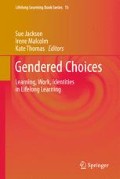Abstract
This chapter will consider the extension of higher-level learning opportunities into the workplace, and examine the effect that gender has on workers ’ ability to take advantage of such opportunities. Drawing a distinction between the young ‘novice’ learners inside the university and those more mature, more experienced learners in the workplace, the chapter will consider both the gendered nature of the labour market, and the effect this has on restricting women’s access to the educational opportunities which are developing through work-based learning. Consideration will be given to both formal and informal structuring of the constraints which are experienced by women workers , and proposals will be put forward relating to how work-based learning could be used to help women overcome the occupational barriers they face.
Access this chapter
Tax calculation will be finalised at checkout
Purchases are for personal use only
References
Billett, S. (2002). Critiquing workplace learning discourses: Participation and continuity at work. Studies in the Education of Adults, 34(1), 56–67.
Billett, S. (2004). Learning through work—workplace participatory practices. In H. Rainbird, A. Fuller, & A. Munro (Eds.), Workplace learning in context. London: Routledge.
Billett, S., Smith, R., & Barker, M. (2005). Understanding work, learning and the remaking of cultural practices. Studies in Continuing Education, 27(3), 219–237.
Boud, D., & Solomon, N. (Eds.). (2001). Work-based learning: A new higher education? Buckingham: Society for Research into Higher Education and Open University Press.
Brennan, J., & Little, B. (1996). A review of work-based learning in higher education. London: Department for Education and Employment.
Chaiklin, S., & Lave, J. (Eds.). (1993). Understanding practice: Perspectives on activity and context. Cambridge: Cambridge University Press.
Charles, N. (2002). Gender in modern Britain. Oxford: Oxford University Press.
Department for Innovation, Universities and Skills (DIUS). (2008). Higher Education at Work—High skills: High value. Consultation document, Department for Innovation, Universities and Skills.
Engestrom, Y. (2004). The new generation of expertise: seven theses. In H. Rainbird, A. Fuller, & A. Munro (Eds.), Workplace learning in context. London: Routledge.
Equal Opportunities Commission (EOC) (2005). Facts About Women and Men in Great Britain.
Equal Opportunities Commission (EOC). (2006). Sex and Power: Who Runs Britain?
Evans, K., Kersh, N., & Sakamoto, A. (2004). Learner biographies: Exploring tacit dimensions of knowledge and skills. In H. Rainbird, A. Fuller, & A. Munro (Eds.), Workplace learning in context. London: Routledge.
Fuller, A. (2003). Participative learning through the work-based route: From apprenticeship to part-time higher education (pp. 27–30). Paper presented at the European Association for Research into Learning and Instruction conference.
Gosling, D. (2001). Lost opportunity: What a credit framework would have added to the national qualification framework. Higher Education Quarterly, 55(3), 270–284.
Hibbett, A. (2003). Key indicators of women’s position in Britain. Labour Market Trends, 2003(October), 503–511.
Jackson, N., & Ward, R. (2004). A fresh perspective on progress files—A way of reporting complex learning and achievement of students in higher education. Assessment and Evaluation in Higher Education, 29(4), 423–449.
Kerfoot, D., & Korcynski, M. (2005). Gender and service: New directions for the study of ‘front-line’ service work. Gender, Work and Organization, 12(5), 387–399.
Laycock, M. (1993). Enterprise in higher education and learner-managed-learning: The use of learning contracts. In N. Graves (Ed.), Learner managed learning: Practice, theory and policy. Leeds: Higher Education for Capability.
Lupton, B. (2006). Explaining men’s entry into female-concentrated occupations: Issues of masculinity and social class. Gender, Work and Organization, 13(2), 103–128.
Martin, P. Y. (2006). Practising gender at work: Further thoughts on reflexivity. Gender, Work and Organization, 13(3), 254–276.
Quality Assurance Agency (QAA). (2004). Report of a Survey to Follow Up Foundation Degree. Reviews Carried Out in 2002–03. Gloucester: Quality Assurance Agency.
Reay, D. (2003). A risky business? Mature working class women student and access to higher education. Gender and Education, 15(3), 301–315.
Robertson, D. (1994). Choosing to change: Extending access, choice and mobility in higher education. The report of the HEQC CAT Development Project. London: Higher Education Quality Council.
Skule, S. (2004). Learning conditions at work: A framework to understand and assess informal learning in the workplace. International Journal of Training and Development, 8(1), 8–20.
Stratton, A., & Perkins, A. (16 June 2009). Speaker candidates call for end to prime minister’s questions. The Guardian.
Tynjala, P. (1999). Towards expert knowledge? A comparison between a constructivist and a traditional learning environment in the university. International Journal of Educational Research, 31(5), 357–442.
Wagner, R., & Childs, M. (2001). Work-based learning as critical social pedagogy. Australian Journal of Adult Learning, 41(3), 314–334.
Walsh, A. (2007). Engendering debate: Credit recognition of project-based workplace research. Journal of Workplace Learning, 19(8), 497–510.
Walters, S. (2005). Making the best of a bad job? Female part-timers’ orientations and attitudes to Work. Gender, Work and Organization, 12(3), 193–216.
Young, M. (2004). Conceptualizing vocational knowledge: Some theoretical considerations. In H. Rainbird, A. Fuller, & A. Munro (Eds.), Workplace learning in context. London: Routledge.
Author information
Authors and Affiliations
Editor information
Editors and Affiliations
Rights and permissions
Copyright information
© 2011 Springer Science+Business Media B.V.
About this chapter
Cite this chapter
Walsh, A. (2011). An Opportunity to Widen Participation Through Work-Based Learning? The Impact of Gender. In: Jackson, S., Malcolm, I., Thomas, K. (eds) Gendered Choices. Lifelong Learning Book Series, vol 15. Springer, Dordrecht. https://doi.org/10.1007/978-94-007-0647-7_11
Download citation
DOI: https://doi.org/10.1007/978-94-007-0647-7_11
Published:
Publisher Name: Springer, Dordrecht
Print ISBN: 978-94-007-0646-0
Online ISBN: 978-94-007-0647-7
eBook Packages: Humanities, Social Sciences and LawEducation (R0)

